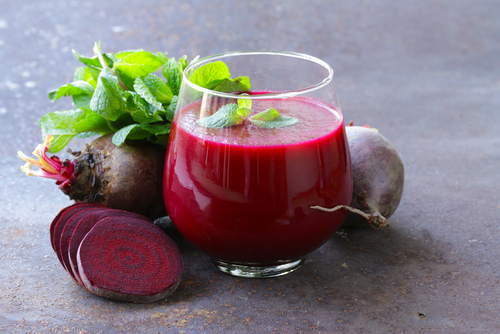Drinking Nitrate-Rich Beetroot Juice May Improve NO Levels in PAH Patients, Small Trial Shows

Drinking nitrate-rich beetroot juice can improve the production of nitric oxide in patients with pulmonary arterial hypertension (PAH), a small clinical trial shows.
Data from the trial was reported in the study, “Effects of oral supplementation with nitrate-rich beetroot juice in patients with pulmonary arterial hypertension — results from BEET-PAH an exploratory randomized, double-blind, placebo-controlled crossover study,” published in the Journal of Cardiac Failure.
Nitric oxide (NO) is known to be an important regulator of blood vessel constriction as well as overall vascular health. In PAH, the NO pathway is often deregulated, and therapies have been approved to promote the increase of NO levels, including Revatio (sildenafil), Adcirca (tadalafil), and Adempas (riociguat).
Consuming foods and drinks rich in nitrate and nitrite compounds can also represent an alternative strategy to increase NO levels, as these can be rapidly converted into NO inside the body.
A team led by researchers at Uppsala University in Sweden conducted a small trial (NCT02000856) to evaluate if such approach could have a therapeutic impact on PAH patients.
The BEET-PAH study enrolled 15 PAH patients, between the ages of 31 and 82, who had mild to moderate disease, corresponding to WHO functional class 2 or 3. Of these patients, 11 were on a stable PAH-specific therapy regimen, and four had been recently diagnosed and had not yet received any treatment.
The participants were randomized to drink either 70 ml of concentrated nitrate-rich or nitrate-depleted beetroot juice twice a day for seven days, followed by four to nine days of a washout period, where they did not have any juice. Afterwards, participants restarted the dietary regimen with beetroot juice for another seven-day period.
This intervention represented a consumption of approximately 1,000 mg of inorganic nitrate per day.
Patients who were on oral PAH therapies were instructed not to take their morning dose on the day of the assessments after each treatment period to ensure that noted changes would be due to the beetroot juice.
After seven days of drinking nitrate-rich beetroot juice, patients showed significantly higher values of fractional exhaled NO (FeNO) — a measure of NO levels that is often found to be low in PAH patients — than the placebo group.
Assessment of alveolar NO concentration and bronchial NO flux also showed a significant increase in patients who drank the nitrate-rich beetroot juice.
Blood and saliva analysis confirmed that, after drinking the nitrate-rich beetroot juice, patients had significantly higher circulating levels of both nitrite and nitrate. About 80% of the patients had an increase of more than 30% in blood nitrite.
Re-analysis of several PAH biomarkers, including NT-proBNP (a marker of heart failure), ADMA (an NO synthase inhibitor), and cardiac function patterns, did not show significant changes after seven days on the beetroot juice. Still, levels of arginine, a compound involved in the NO pathway, were found to be increased compared with placebo.
Interested in PH research? Check out our forums and join the conversation!
Three out of five measurements of right ventricular function showed mild improvements for patients on the nitrate-rich beetroot juice. However, these changes were not significant, and the overall right ventricular function was not changed compared with placebo.
Evaluation of respiratory function also failed to show significant changes in patients who drank the nitrate-rich beetroot juice compared with the placebo group. Additionally, the physical capacity of the patients, as determined by the six-minute walking distance test, was not changed.
Still, researchers noted a reduction in breathing frequency at maximum work for patients on the nitrate-rich beetroot juice.
This study demonstrates “for the first time that oral supplementation with nitrate-rich beetroot juice administered for one week increases levels of exhaled NO” in PAH patients, the team wrote.
Although the intervention did not induce major changes, the slight improvements reported can be “highly relevant to this patient population as it indicates that ingestion of beetroot juice is associated with a greater efficiency in terms of power output per liter of O2 [oxygen] consumed,” they wrote.
Additional studies are warranted to further explore the therapeutic potential of nitrate intake, in particular at levels that could be achievable through a diet rich in fruit and vegetables.







